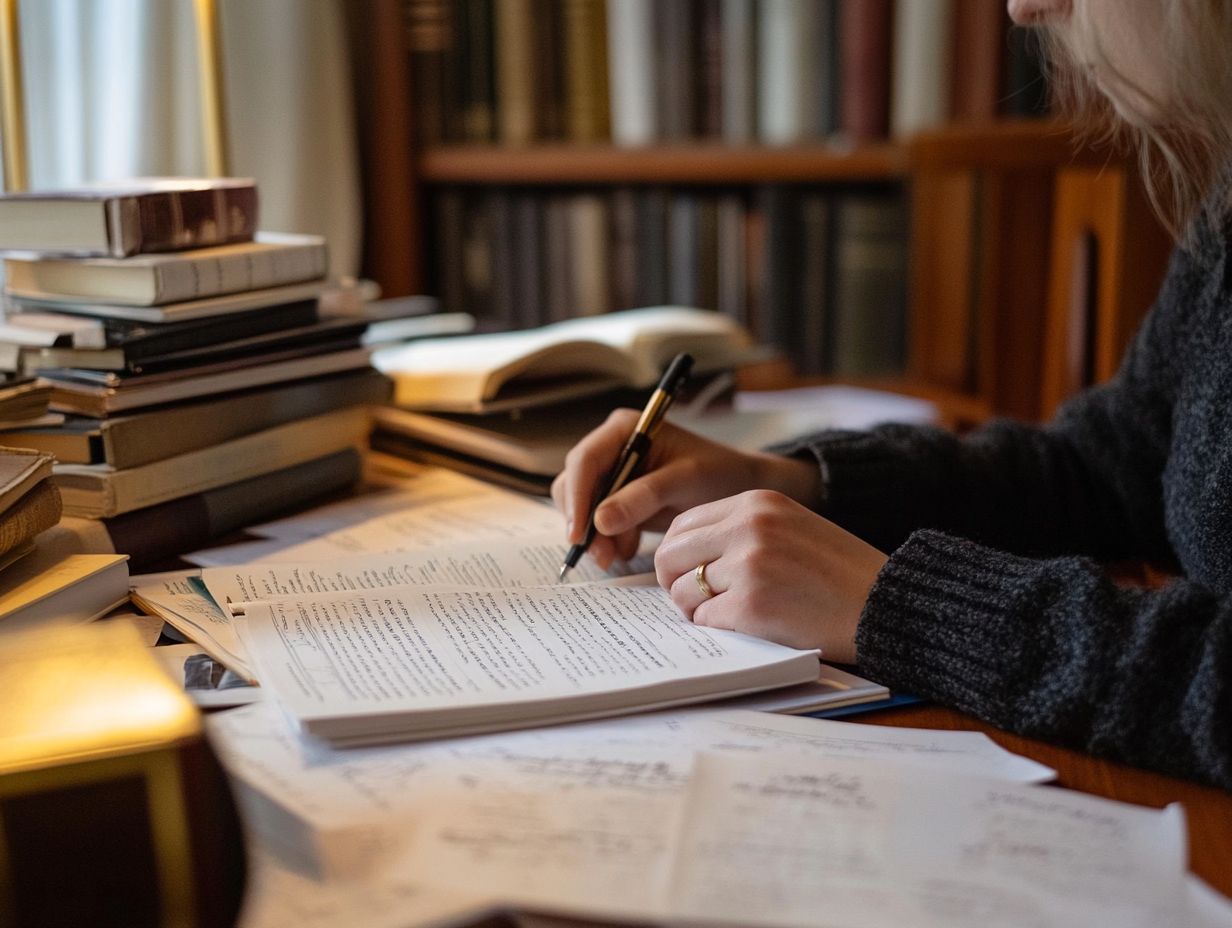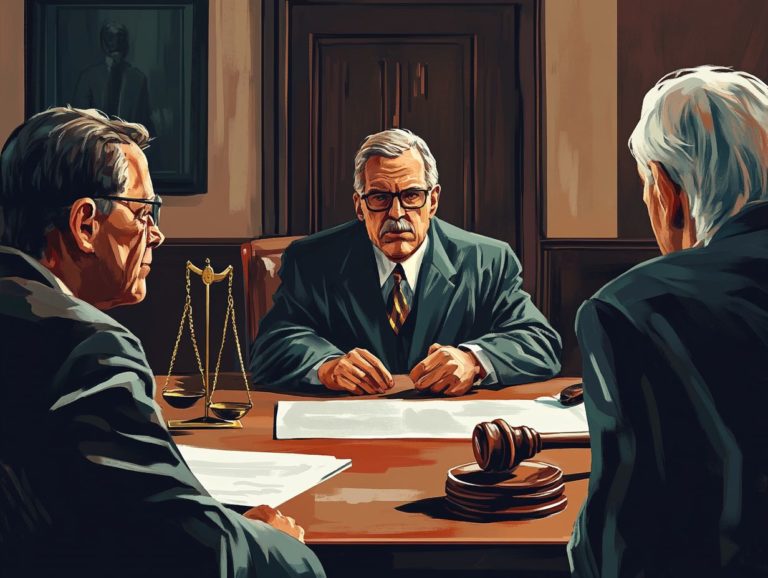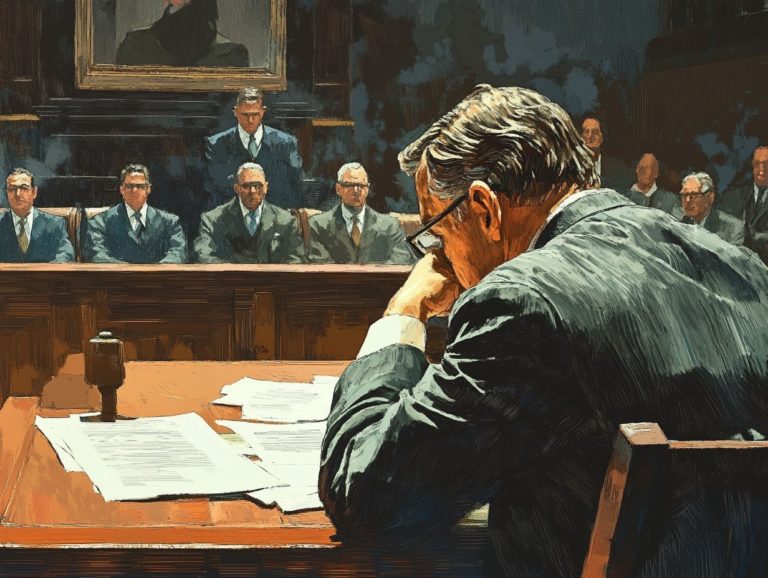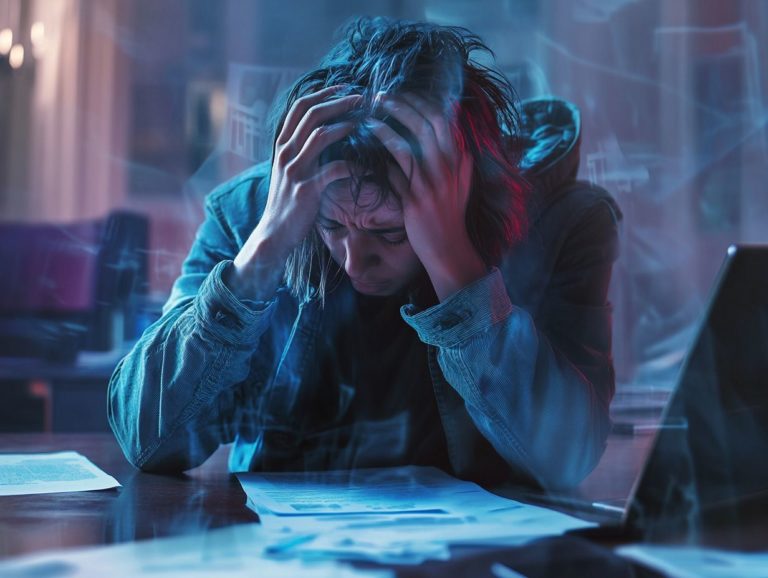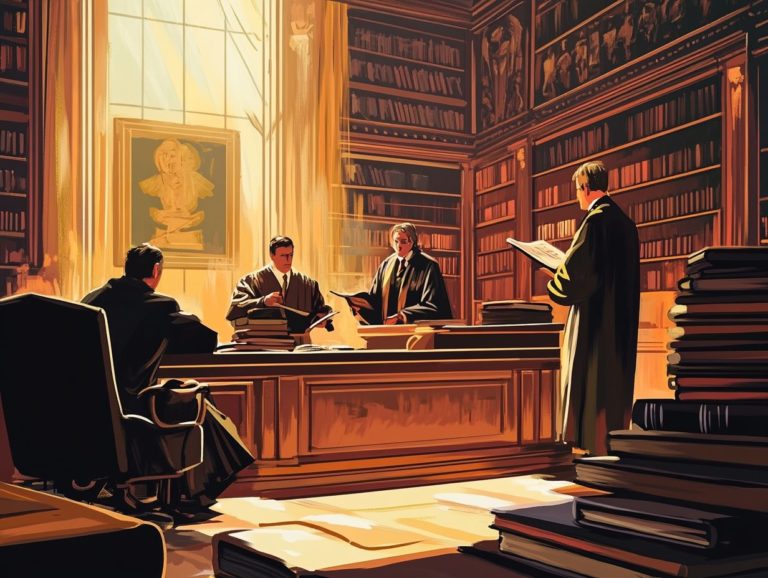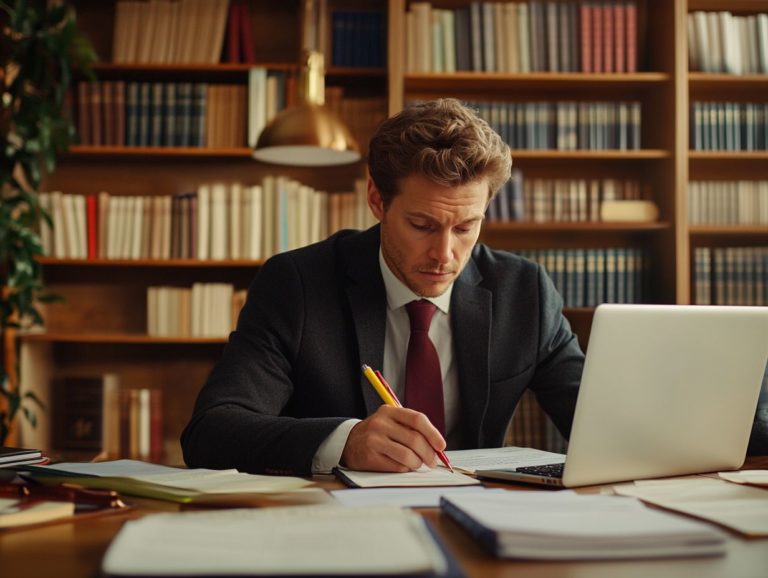How to Prepare for a Criminal Defense Case?
Facing a criminal charge can feel like navigating a stormy sea. Grasping the nuances of a defense case is vital for anyone in this challenging position.
This article will illuminate essential terminology, key legal concepts, and the process of securing a competent criminal defense attorney. You ll discover how to craft a robust defense strategy, prepare effectively for court proceedings, and navigate courtroom etiquette with finesse.
Possible outcomes and subsequent steps will be examined, empowering you to tackle your case with the confidence it deserves.
Contents
- Key Takeaways:
- Understanding the Basics of a Criminal Defense Case
- Finding and Hiring a Criminal Defense Attorney
- Building a Strong Defense Strategy
- Navigating the Legal System
- Possible Outcomes and Next Steps
- Preguntas Frecuentes
- Qu pasos debo seguir para prepararme para un caso de defensa criminal?
- C mo puedo encontrar un buen abogado de defensa criminal?
- Qu documentos debo recopilar para mi caso de defensa criminal?
- Debo hablar con la polic a o el fiscal antes de mi caso de defensa criminal?
- Qu puedo hacer para ayudar a mi abogado de defensa criminal a prepararse para mi caso?
- C mo puedo prepararme mentalmente para mi caso de defensa criminal?
Key Takeaways:
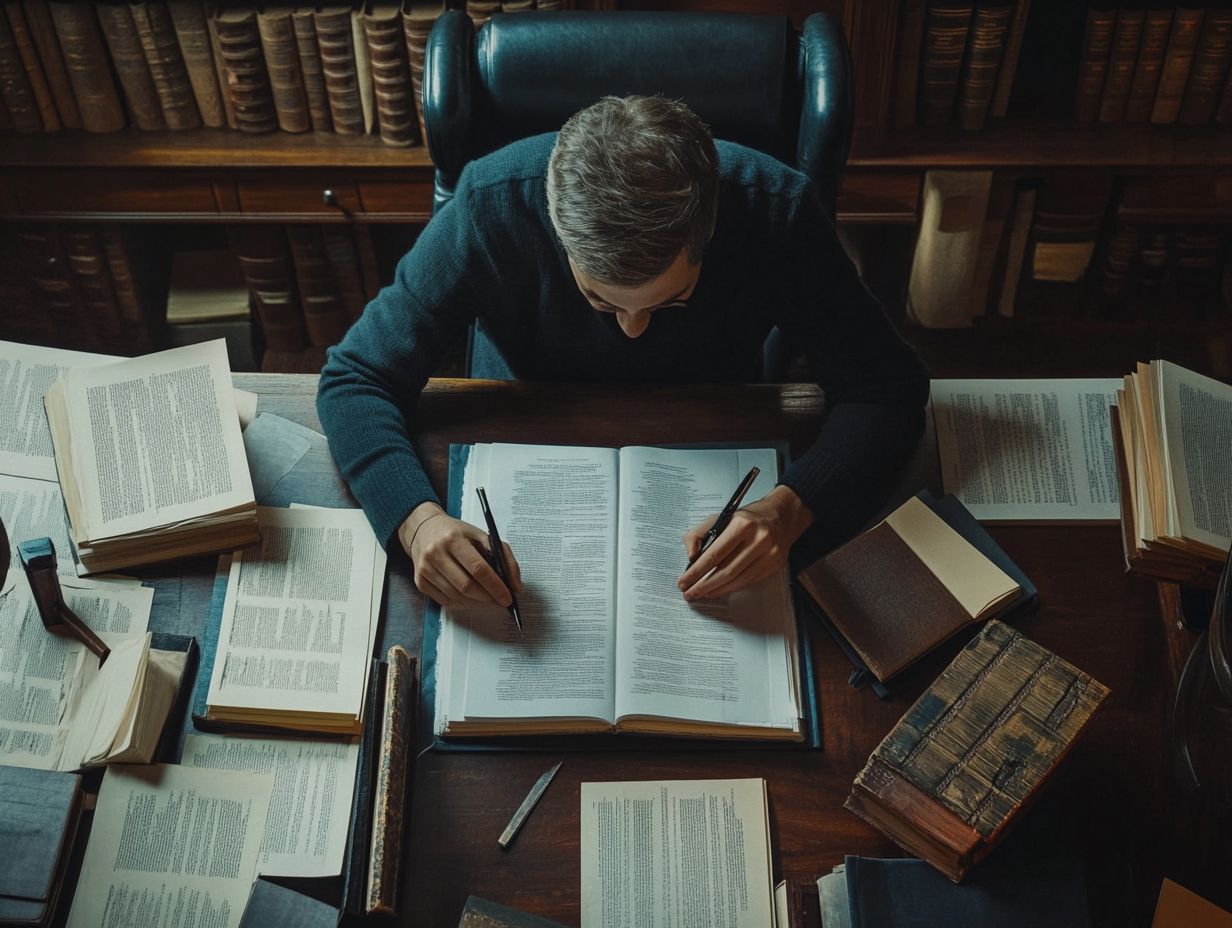
- Understand the basics of a criminal defense case, including key terminology and how to find and hire a lawyer.
- Building a strong defense strategy starts with gathering evidence and preparing for court proceedings.
- Navigate the legal system by understanding courtroom etiquette, the role of the judge and jury, and potential outcomes and next steps.
Understanding the Basics of a Criminal Defense Case
Grasping the fundamentals of a criminal defense case is crucial for anyone navigating the legal system. It involves understanding the complex interplay between criminal charges and defense strategies.
The special relationship between you and your lawyer can significantly influence the outcomes of your case.
A thorough approach to defense relies heavily on your ability to prepare meticulously for trial. This means gathering evidence diligently while providing emotional support to the defendant throughout the trial process.
Familiarizing yourself with your rights is essential. Understanding the overall structure of criminal trials can significantly influence the outcomes of the cases at hand.
Key Terminology and Legal Concepts
Familiarizing yourself with essential terminology and legal concepts in criminal defense is vital for navigating complex cases.
Understanding terms like “the burden of proof” and “evidence analysis” can significantly affect court proceedings.
Grasping the nuances of mitigating factors is crucial for how you present a defense.
These factors can influence how a judge or jury perceives circumstances that deserve a more lenient sentence.
Witness testimony serves as a pivotal element in the courtroom, often determining the credibility of claims made by either party.
A well-planned plea agreement can alter the course of a trial, allowing you to negotiate terms that may lead to reduced charges or sentences.
Ultimately, having a solid understanding of these legal concepts can shape your defense strategy and significantly impact the outcome of your case.
Finding and Hiring a Criminal Defense Attorney
Finding the right attorney can make or break your case. Don’t wait start your search today! Hiring a qualified criminal defense attorney is a crucial step in securing effective representation.
It demands careful consideration of several factors to ensure that you receive legal advice tailored to the specific needs of your case, especially in jurisdictions like Medford, OR, and Montana courts.
Qualities to Look for in a Lawyer
When you re on the hunt for a criminal defense lawyer, prioritize a few key qualities. Look for someone with a comprehensive understanding of legal precedents and a solid defense strategy.
A knack for courtroom etiquette is essential to navigate proceedings with finesse.
Consider the attorney s experience with cases similar to yours. This ensures they grasp the nuances that could significantly influence your case’s outcome.
Strong negotiation skills are equally vital, especially when discussing plea deals, which are agreements to plead guilty to a lesser charge. A skilled lawyer can make a substantial difference in the terms you re offered.
Clear and effective communication with your attorney is paramount. The relationship between you and your counsel should be built on transparency and trust.
An attorney who can break down complex legal concepts into relatable terms not only eases your anxieties but also empowers you to make informed decisions.
Costs and Payment Options

Understanding the costs of hiring a criminal defense attorney is crucial. Various payment options can greatly affect the affordability of your defense.
Many professionals in this field offer different pricing models, such as flat fees and hourly rates. Each has its own advantages and potential drawbacks. A flat fee may provide predictable costs, while hourly rates can lead to unexpected expenses if your case gets complicated.
Exploring payment plans can help ease financial strain, allowing you to budget more effectively. Keep in mind that these financial considerations often reflect the quality of legal strategy you receive.
A well-structured payment plan gives you the power to choose a defense attorney whose expertise aligns with your needs. This ultimately ensures the best possible outcome for your situation.
Building a Strong Defense Strategy
Building a robust defense strategy is essential for any criminal trial. It involves a careful process of gathering evidence, analyzing witness testimony, and researching a criminal defense lawyer to tailor your approach to the unique factors of your case.
Each step contributes to a well-rounded defense that can significantly impact the outcome.
Gathering Evidence and Witness Testimonies
Gathering evidence and witness testimonies is key to crafting an effective legal strategy. The strength and credibility of this evidence can sway the outcome of a trial.
Ensure that police reports are carefully written and factually accurate. These documents are essential throughout the legal process.
When interviewing witnesses, adopt a sensitive, detail-oriented approach. Use open-ended questions to elicit more informative responses. Techniques like cognitive interviewing can enhance the clarity of their recollections.
Using forensic analysis like fingerprint matching and DNA profiling provides compelling evidence that strengthens your case. Understanding chain of custody protocols is equally crucial to maintain the integrity of collected evidence, ultimately reinforcing your legal arguments in court.
Preparing for Court Proceedings
Preparing for court proceedings is essential for any defense attorney. Effective trial preparation requires more than just understanding the case; it demands a keen focus on courtroom decorum and the anticipated behaviors of all parties involved.
Start by reviewing relevant case laws, identifying precedents that could impact your case’s outcome. Practicing courtroom etiquette is vital; mastering formal addresses, respectful language, and presentation is key to establishing credibility with the judge.
Moreover, strategizing how to engage with the jury can enhance their perception of your arguments. Determine the most effective approaches for your opening statements, witness examinations, and closing arguments each critical for successfully conveying your case to the court.
Navigating the legal system is an essential skill, whether you’re a defendant or an attorney. Grasping courtroom etiquette and recognizing the distinct roles of the judge and jury can profoundly influence the course of a criminal trial.
Courtroom Etiquette and Procedures
Courtroom etiquette and procedures are essential elements of the criminal trial process. Your understanding of these aspects can significantly influence how cases are perceived by the jury and the overall dynamics within the courtroom.
From the moment you step into the courtroom, your appearance conveys a powerful message. Dressing appropriately typically in a conservative and professional manner not only commands respect but also underscores the seriousness of the proceedings.
Your communication style is equally crucial. It s important to maintain a courteous tone while articulating your thoughts clearly. Always avoid slang or overly casual expressions.
Adhering to procedural norms is vital. Always address the judge respectfully and stand when required. Following the established order of speaking is essential for upholding decorum.
By understanding these facets of courtroom conduct, you can contribute to ensuring a fair and orderly trial process.
Understanding the Role of the Judge and Jury
Understanding the distinct roles of the judge and jury is essential to grasping the dynamics of a criminal trial. Each has responsibilities that can significantly sway the trial’s outcome, especially regarding the burden of proof.
The judge serves as the impartial arbiter, ensuring that legal procedures are carefully followed and guiding the proceedings. The judge rules on what evidence can be presented.
On the other hand, the jury is made up of citizens chosen from the community. They play an active role in evaluating the facts, weighing the evidence, and ultimately delivering a verdict based on the standard of reasonable doubt (the idea that if there’s any uncertainty, the jury must side with the defendant).
This symbiotic relationship is vital. The trial’s effectiveness depends not only on the judge’s legal expertise but also on the jury’s ability to understand and deliberate the complexities of the case. This dynamic influences the strategies employed by legal counsel throughout the trial, making it a critical interplay in the pursuit of justice.
Possible Outcomes and Next Steps
Navigating the landscape of potential outcomes and next steps after a criminal trial is crucial for you as a defendant. Understanding what unfolds at the verdict stage, along with the implications of different verdicts, can significantly influence your future legal strategies and options for appeals.
Being prepared can make all the difference!
Best and Worst Case Scenarios
Understanding the best and worst-case scenarios in a criminal trial is essential for setting realistic expectations. This knowledge gives you the power to comprehend the spectrum of possible outcomes, which can vary dramatically based on the nature of the charges.
For example, a misdemeanor might result in a modest fine or community service, offering a relatively hopeful outlook. In contrast, felony charges could lead to significant imprisonment, representing a much grimmer possibility.
These contrasting outcomes are pivotal in influencing your defense lawyer’s tactics. They need to analyze the evidence, weigh plea deals, and prepare for court in a way that aims to minimize the worst outcomes while pursuing the most favorable ones.
Ultimately, grasping these potential outcomes can enhance your decision-making during critical moments of the trial.
Appeals and Post-Trial Options
Exploring appeals and post-trial options is essential if you’re looking to challenge a verdict or seek alternative resolutions after a criminal trial.
Navigating the intricacies of the appeals process typically starts with a comprehensive review of the trial records. This allows you to pinpoint potential legal errors or rights violations that could justify a successful appeal.
Common grounds for appeal often include issues such as:
- Jury misconduct
- Improper admission of evidence
- Ineffective assistance of counsel
Each of these issues is capable of significantly influencing the outcome.
You might also consider options like filing a motion for a new trial or seeking post-conviction relief. These avenues enable you to present new evidence or argue that your constitutional rights were compromised during the initial proceedings.
Don’t wait! Get legal advice immediately to explore your options. Skilled representation will ensure that you are thoroughly informed of your rights and the various paths available to pursue a just resolution.
Preguntas Frecuentes
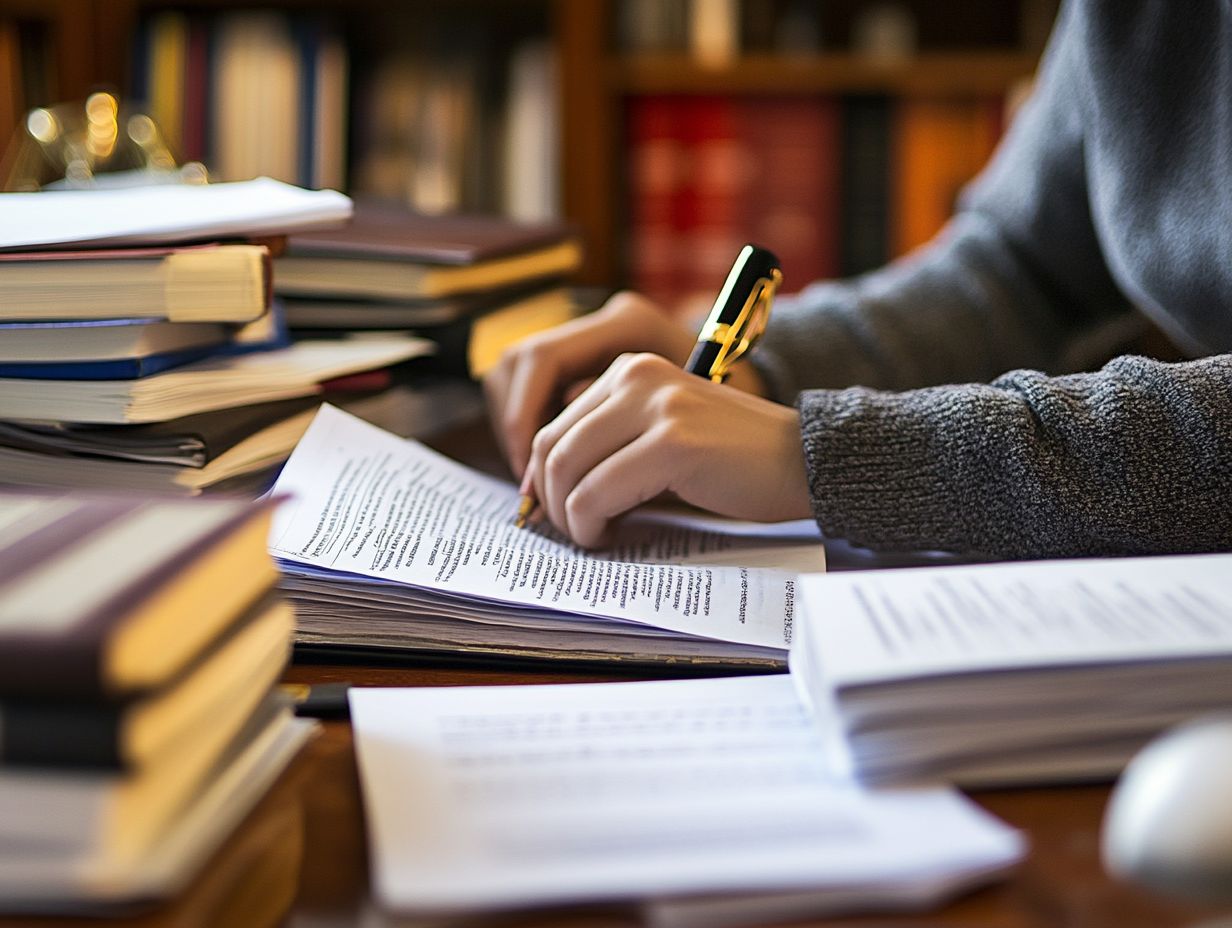
Qu pasos debo seguir para prepararme para un caso de defensa criminal?
Para prepararte, contrata a un abogado experto en defensa criminal. Re ne todos los documentos relevantes, pruebas y testigos para apoyar tu caso.
Asiste a todas las audiencias y reuniones con tu abogado. Cuida tambi n tu salud f sica y mental durante este proceso.
C mo puedo encontrar un buen abogado de defensa criminal?
Pide recomendaciones a amigos o familiares que hayan enfrentado situaciones similares. Tambi n investiga en l nea o contacta a tu colegio de abogados local.
Es clave elegir a un abogado con experiencia y un buen historial en defensa criminal.
Qu documentos debo recopilar para mi caso de defensa criminal?
Los documentos necesarios dependen de los cargos y circunstancias de tu caso. Generalmente, recoge informes policiales, declaraciones de testigos y registros m dicos.
Tu abogado te indicar exactamente qu necesitas.
Debo hablar con la polic a o el fiscal antes de mi caso de defensa criminal?
No hables con la polic a o el fiscal antes de consultar a tu abogado. Lo que digas puede usarse en tu contra.
Deja que tu abogado maneje la comunicaci n para proteger tus derechos.
Qu puedo hacer para ayudar a mi abogado de defensa criminal a prepararse para mi caso?
S honesto sobre todos los detalles de tu caso. Proporciona documentos o evidencia que tengas y prep rate para responder preguntas.
Sigue las instrucciones de tu abogado a lo largo del proceso.
C mo puedo prepararme mentalmente para mi caso de defensa criminal?
Un caso de defensa criminal puede ser emocionalmente agotador. Mantente positivo y rod ate de un buen sistema de apoyo.
Busca ayuda profesional si te sientes ansioso. Conf a en tu abogado y ten fe en el sistema legal.

